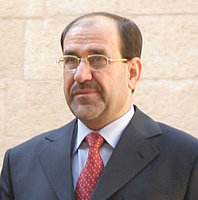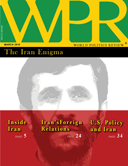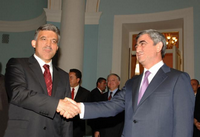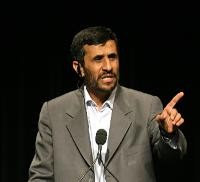As the push for a new round of sanctions against Iran falters, it’s becoming increasingly apparent that the Obama administration’s game plan on Iran policy was long on tactics and short on strategy. We’ve heard a bit about how U.N sanctions are up against a “bad UNSC,” which currently includes Brazil, Turkey and Lebanon as non-permanent members. But that should come as no surprise, and the same goes for those three countries’ predictable resistance to getting vocally on board for stiff sanctions. Now comes word that the administration is trying to carve out an exemption for China in unilateral U.S. […]
Middle East & North Africa Archive
Free Newsletter
Turkey’s decision to recall its ambassador in Washington for discussions following yesterday’s passage of the Armenian Genocide bill by the House Committee on Foreign Affairs is understandably getting quite a bit of attention. But in what is likely to be the overlooked counterbalance to that decision, Turkish Foreign Minister Ahmet Davutoglu said today that Ankara remained determined to normalize relations with Armenia, although he acknowledged that parliamentary ratification of recently signed protocols was not guaranteed. The recall of the ambassador signals Turkey’s willingness to flex its diplomatic muscles, which the Obama administration currently has need of in addressing Iran’s nuclear […]
This Leila Fadel article about tensions among Iraq’s Kurds highlights how our contingency planning in Iraq takes Kurdish solidarity and stability for granted. In fact, both are pretty recent developments, and, counterintuitively, could be undermined by further stabilization of Iraq’s national political landscape. For all its stability, Iraq’s Kurdish region has made little progress in terms of democratic governance or rule of law. So as stability becomes more nationally widespread, and therefore less locally urgent, and as the Kurds begin to pursue their interests within the context of Iraq’s national politics, as opposed to in opposition to Baghdad, internal faultlines […]

Iraq’s parliamentary elections this Sunday, March 7, will close the first full chapter in the country’s transformation to a democratically elected, majority-rule system of government. The government elected in December 2005 consolidated Shiite rule and eventually brought Iraq a degree of security as Prime Minister Nouri al-Maliki tightened his grip on the levers of power. Now the nation’s corruption, fragile peace and lack of national reconciliation have left many looking for change — including American officials eager to see, if not a new Iraqi leader, at least a shake-up in the composition of his government. They will likely be disappointed. […]
NewsHour’s Ray Suarez reports on violence that sprang up as Iraqi citizens lined up for early voting. The much anticipated parliamentary elections have moved forward, despite violence that has sprouted throughout the country to deter voters from making it to the polls. As democracy fights for a place on the Iraqi political stage, the Obama administration continues to talk about an impending withdrawal.

As U.S. policymakers and other governments around the world search for an approach that will convince Iran to stop short of crossing the nuclear weapons threshold, Iran continues to send very mixed signals, and shows no signs of abandoning progress toward producing weapons-grade nuclear material. Meanwhile, Iran is in the midst of an internal political struggle that is often opaque from the outside, but could have major consequences for the country’s position in the region and the world. This World Politics Review special report examines “The Iran Enigma.” This report is a compilation of 25 articles on Iran published in […]

Demonstrating a predictable lack of strategic foresight, the U.S. Congress plans to renew its obsession with the Armenian genocide tomorrow, when the House Committee on Foreign Affairs will hold its mark-up session for the Armenian Genocide resolution. In 2007, the resolution — which “[calls] upon the president to ensure that the foreign policy of the United States reflects appropriate understanding and sensitivity concerning . . . the Armenian Genocide” — passed out of committee but never reached a vote on the House floor, following a strong pushback effort from the Bush administration. The supporters of this year’s iteration hope the […]
In the lead up to the much anticipated March 7 parliamentary election in Iraq, VOA’s Deborah Block reports on the political climate in the country. Experts say they are looking to see if coalitions will be formed along nationalist or religious lines. More than four hundred candidates have been banned from running in the election, causing apprehension in the international community that election results may not be seen as legitimate — an outcome that would be a serious blow to Iraq’s democratic progress.
It would be hard, under any circumstances, not to see this as a pretty significant development: The leader of anal-Qaida-linked Chinese militant group has been killed in a U.S. drone attack inPakistan’s restive tribal region, an official said on Monday. AbdulHaq al-Turkistani, the leader of the Eastern Turkistan Islamic Party, and twocomrades died when a missile fired from a CIA-operated pilotless aircraft strucka vehicle in North Waziristan district Feb. 15. . . . Al-Turkistani hails from Uighur in China’s eastern province ofXinjiang. But in the current context of strained U.S.-China relations, as well as the need for China’s UNSC vote […]

Iranian officials have recently accused the United States of plotting to use a Sunni terrorist group, Jundallah, to overthrow the Islamic Republic of Iran. Though Tehran has made such charges before, this is the first time the Iranian government has explicitly tied the alleged efforts to President Barack Obama. Several reasons explain both the motivations behind Tehran’s accusations as well as their timing. On Feb. 23, the Iranian government reported that it had captured Abdolmalek Rigi, leader of the Jundallah terrorist group. A Kyrgyz airline later confirmed that one of its planes had been intercepted in Iranian air space and […]
Two noteworthy outcomes of Russian President Dmitry Medvedev’s visit to Paris: Russia and France confirmed previous reports that the sale of a Mistral-class vessel now involves four ships, with negotiations now focused on where they will be built. (France wants at least two of the vessels built in its shipyards, and specified that it will deliver them without weapons systems.) And as if by coincidence, Medvedev flirted even further with the idea of new sanctions against Iran. There are three things to keep in mind here. First, despite the bad messaging the sale of the Mistral sends to Eastern Europe, […]
I’ve noted on a few occasions here on the blog the lack of fiction, as opposed to non-fiction memoirs, to have emerged from America’s current wars. Soon after the last time I did so, I received an e-mail from Luke Larson, a veteran of two tours in Iraq, to inform me that he had in fact written a novel based on his experiences there. I took Larson up on his offer to send a copy, and the book, “Senator’s Son,” arrived on Friday. I gave the first few pages a glance the following morning to get a feel for it, […]
The upcoming Iraqi parliamentary elections loom large in the political fortunes of so many players, both internal and external, that it constitutes a historical referendum of sorts — not just for Iraq, but beyond as well. Across the region, globalization, in all its complex currents, appears poised at a number of inflection points. The outcome of Iraq’s elections will leave winners on some fronts, losers on others, and will trigger plenty of bandwagoning by those worried about being left out or left behind. Here’s a list of some potential outcomes, none of which are mutually exclusive, in rough order of […]
